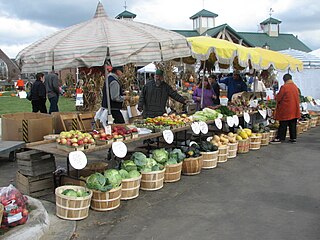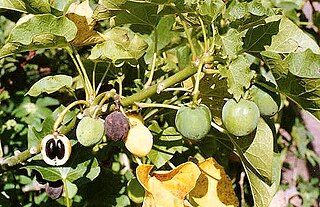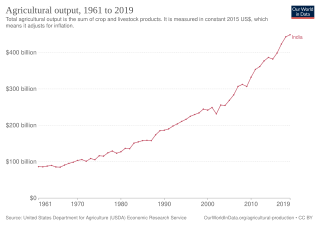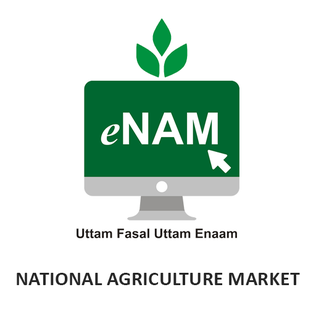Related Research Articles

The Common Agricultural Policy (CAP) is the agricultural policy of the European Commission. It implements a system of agricultural subsidies and other programmes. It was introduced in 1962 and has since then undergone several changes to reduce the EEC budget cost and consider rural development in its aims. It has however, been criticised on the grounds of its cost, its environmental, and humanitarian effects.

Community-supported agriculture or cropsharing is a system that connects producers and consumers within the food system closer by allowing the consumer to subscribe to the harvest of a certain farm or group of farms. It is an alternative socioeconomic model of agriculture and food distribution that allows the producer and consumer to share the risks of farming. The model is a subcategory of civic agriculture that has an overarching goal of strengthening a sense of community through local markets.

Subsistence agriculture occurs when farmers grow crops to meet the needs of themselves and their families on smallholdings. Subsistence agriculturalists target farm output for survival and for mostly local requirements. Planting decisions occur principally with an eye toward what the family will need during the coming year, and only secondarily toward market prices. Tony Waters, a professor of sociology, defines "subsistence peasants" as "people who grow what they eat, build their own houses, and live without regularly making purchases in the marketplace".

A cash crop, also called profit crop, is an agricultural crop which is grown to sell for profit. It is typically purchased by parties separate from a farm. The term is used to differentiate marketed crops from staple crop in subsistence agriculture, which are those fed to the producer's own livestock or grown as food for the producer's family.

A farmers' market is a physical retail marketplace intended to sell foods directly by farmers to consumers. Farmers' markets may be indoors or outdoors and typically consist of booths, tables or stands where farmers sell their produce, live animals and plants, and sometimes prepared foods and beverages. Farmers' markets exist in many countries worldwide and reflect the local culture and economy. The size of the market may be just a few stalls or it may be as large as several city blocks. Due to their nature, they tend to be less rigidly regulated than retail produce shops.
Agribusiness is the industry, enterprises, and the field of study of value chains in agriculture and in the bio-economy, in which case it is also called bio-business or bio-enterprise. The primary goal of agribusiness is to maximize profit while satisfying the needs of consumers for products related to natural resources such as biotechnology, farms, food, forestry, fisheries, fuel, and fiber.

An Agricultural Produce Market Committee (APMC) is a marketing board established by state governments in India to ensure farmers are safeguarded from exploitation by large retailers, as well as ensuring the farm to retail price spread does not reach excessively high levels. APMCs are regulated by states through their adoption of a Agriculture Produce Marketing Regulation (APMR) Act.

Mick Bates was a Welsh politician who was a Member of the Welsh Assembly (AM) for Montgomeryshire from 1999 to 2011. Bates was a member of the Welsh Liberal Democrats, before serving out the rest of his term as an Independent.

Biofuel development in India centres mainly around the cultivation and processing of Jatropha plant seeds, which are very rich in oil, ranging from 27 to 40%, and averaging 34.4%. The drivers for this are historic, functional, economic, environmental, moral and political.

The history of agriculture in India dates back to the Neolithic period. India ranks second worldwide in farm outputs. As per the Indian economic survey 2020 -21, agriculture employed more than 50% of the Indian workforce and contributed 20.2% to the country's GDP.
The BAIF Development Research Foundation is a NGO based in Urali Kanchan near Pune in Maharashtra, India, that pioneers agricultural development. It was founded in 1967 by Manibhai Desai as the Bharatiya Agro Industries Foundation. Under Manibhai, BAIF pioneered cross breeding of high yielding European cattle such as Holstein Freisian and Jersey with the sturdy Indian breeds such as Gir from Gujarat. Later BAIF expanded the scope of activities to include animal health, nutrition, afforestation wasteland development, and tribal development.
Farm Progress is the publisher of 22 farming and ranching magazines. The company's oldest publication began in 1819. Farm Progress Companies is owned by Informa.

The Ministry of Finance is a ministry within the Government of India concerned with the economy of India, serving as the Treasury of India. In particular, it concerns itself with taxation, financial legislation, financial institutions, capital markets, centre and state finances, and the Union Budget.

Laiki agora, also common in the plural Laikes agores, are farmers' markets that operate all over Greece, selling foodstuffs and gardening or household equipment, as well as children's toys and various "do it yourself" tools.

Agricultural marketing covers the services involved in moving an agricultural product from the farm to the consumer. These services involve the planning, organizing, directing and handling of agricultural produce in such a way as to satisfy farmers, intermediaries and consumers. Numerous interconnected activities are involved in doing this, such as planning production, growing and harvesting, grading, packing and packaging, transport, storage, agro- and food processing, provision of market information, distribution, advertising and sale. Effectively, the term encompasses the entire range of supply chain operations for agricultural products, whether conducted through ad hoc sales or through a more integrated chain, such as one involving contract farming.

Regional Rural Banks (RRBs) are government owned scheduled commercial banks of India that operate at regional level in different states of India. These banks are under the ownership of Ministry of Finance, Government of India, Sponsered Bank and concerned State Government in the ratio of 50:35:15 respectively. They were created to serve rural areas with basic banking and financial services. However, RRBs also have urban branches.

Pradhan Mantri Gramin Aawas Yojana, previously Indira Awas Yojana, is a social welfare programme, created by the Indian Government, to provide housing for the rural poor in India. A similar scheme for urban poor was launched in 2015 as Housing for All by 2022. Indira Awas Yojana was launched in 1985 by Rajiv Gandhi, the Prime Minister of India, as one of the major flagship programs of the Ministry of Rural Development to construct houses for the Below Poverty Line population in the villages.

Agriculture in India is highly susceptible to risks like droughts and floods. It is necessary to protect the farmers from natural calamities and ensure their credit eligibility for the next season. For this purpose, the Government of India introduced many agricultural social insurances throughout the country, the most important one of them being Pradhan Mantri Fasal Bima Yojana.

National Agriculture Market or eNAM is an online trading platform for agricultural commodities in India. The market facilitates farmers, traders and buyers with online trading in commodities.
Gramin Bhandaran Yojana, or Rural Godown Scheme, is an Indian government initiative to offer subsidies to individuals or organizations which build or repair rural godowns.
References
- ↑ FNB News - Govt’s call to connect 22,000 rural agri mkts to eNAM disappoints APMC | FNB News
- ↑ Gramin market is Delhi’s version of Uzhavar Sandhai- The New Indian Express
- ↑ Will Develop And Upgrade 22000 Rural Haats Into Gramin Agricultural Markets, Says Finance Minister, Arun Jaitley - Bloomberg Quint